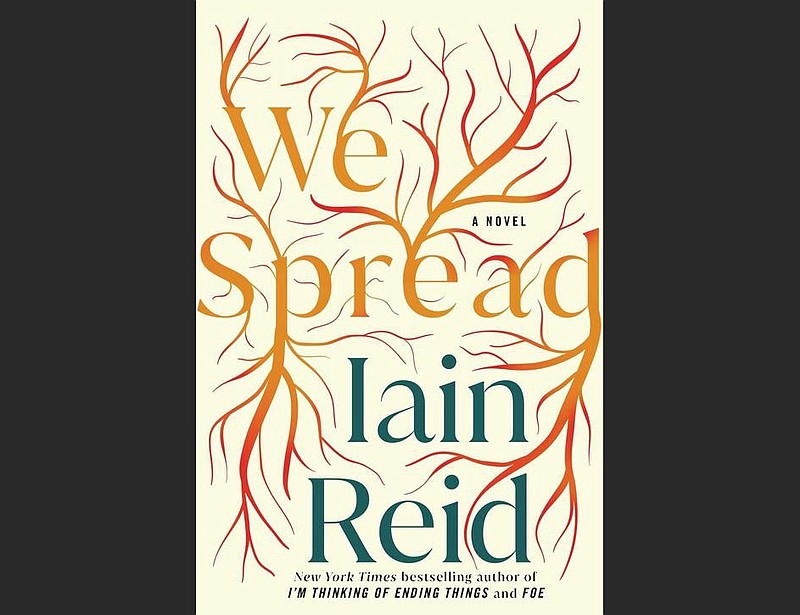- They say that old trees just grow stronger,
- And old rivers get wilder every day,
- But old people, they just get lonesome ....
- — John Prine, "Hello in There"
What will happen is scarier than what might happen.
No clown is likely to lure you into a sewer, and if he does, then who have you to blame but yourself? But there is a very good chance your mind will go — maybe it is already starting to go? — and it is for certain that if you live long enough your body will betray you in ways petty and profound.
As the Flaming Lips remind us, everyone you know is going to die. Your little dog is going to die. To be human is to both have sure knowledge of the end and the ability to suspend belief.
To be human is to block out the horror.
Iain Reid's "We Spread" (Scout Press, $26.99) is a young man's novel about growing old. Though Reid is an acclaimed writer of literary fiction, I had not read any of his previous work, though I was impressed with Charlie Kaufman's film version of his first novel, "I'm Thinking of Ending Things." Reid is a Canadian and his sister is first lady of Iceland, and his prose is as straightforward as his ideas are delicate and nuanced.
Some novelists build worlds or universes; Reid is more a jeweler. There is an understated "exquisiteness" to "We Spread," a delicate, watch-like balance to the novel. It is easy to read; you will feel briskly pulled along, confident that you've mastered the narrative. And then the world will drop away and you'll feel lost and clueless, wondering through whose eyes you are seeing and what sense has to do with the immersive nightmare you are reading. But then you snap back and think that this must be exactly what it is like. To be old.
Penny is in her 80s and alone. She has an apartment in the city, where she liked living with her partner. They never married; he was "a prolific painter of merit and distinction" who died, as she knew he would. She was an artist too, of a sort, the sort who never shows their work, who never completes a project. She lives surrounded by unfinished canvases and "the listless stacks and heavy piles of a life already lived: vinyl records, empty flowerpots, clothing, dishes, photo albums, magazines about art, drawings, letters from friends, the library of paperback books lining my shelves."
She's unsentimental about these things that once meant so much to her. They have to be somewhere. They're just stuff.
Penny hears voices in the walls. Maybe echoes of long-ago conversations. The inexplicable sighs of an old building. (Maybe she hears us, for a reader is like a ghost in the world of a book, and what is it to be a ghost except to perceive without being perceived? Or perceived only peripherally, like a poem.)
Though Penny cannot remember it, arrangements were made long ago. When Penny slips while attempting to change a light bulb, it is decided. She's whisked from her apartment by her landlord and taken to a facility in the woods, a long-term assisted living residence in a 19th-century mansion called Six Cedars Residence. It is a kind of heaven, really, a beautiful house with beautiful views. There are three other clients lodged there; they are attended by Jack and the facility's leader Shelley, whose vision Six Cedars exists to fulfill.
Here Penny is cared for and touched. She is bathed and her nails are clipped. She enjoys the other residents, even the silent violinist Paul. Ruth is sometimes loud and silly; she peppers her conversation with French phrases. Hilbert, a retired mathematician, has an interesting mind and a philosophical bent. He might have a crush on Penny. It might be mutual.
Jack is a damaged man working toward his own redemption. He wants to be Penny's ally. But he is afraid of Shelley.
Something sinister is going on at Six Cedars. There's something strange about the food. How did they arrange to hang Penny's partner's paintings on their walls? Why is Penny painting again, to the point of almost finishing? Is she finally going to have her own show? What would be the point?
Deep in the novel, Penny and Hilbert are talking about something called the Riemann hypothesis, which some numbers people believe is the most important unsolved problem in pure mathematics. Hilbert begins to explain the nature of the problem to Penny — it has to do with prime numbers and something called the Euler-Riemann zeta function — but suddenly loses the thread.
"I used to know all of this by heart and how to describe it," he says. "I'm afraid it's just not coming right now. I'm sorry."
Penny responds.
"It's OK. I thought that I completely understood the point of painting, but as I got older I started thinking that art is about different ways of seeing," she says. "I was never inspired by something whole. It was always a fragment, a crumb, a piece of a moment, a half-forgotten impression, one side of a person."
This is a clue to Reid's method. He's a kind of pointillist, each of his moments is discrete. You step back to see the picture.
"We Spread" is a surreal horror story. We don't know what is "real" and what Penny's aged and possibly failing mind is producing. The big house itself seems to change, and the time spent inside it is different from time in the rest of the world, which is inaccessible anyway, given that the residents aren't allowed outside, where there is danger, where there are bears and sunlight.
This is a story told by an unreliable narrator in service of an author interested less in providing a satisfying resolution to the chord than facing some ultimate human truth. It's getting late. It's getting dark.
Email: pmartin@adgnewsroom.com
